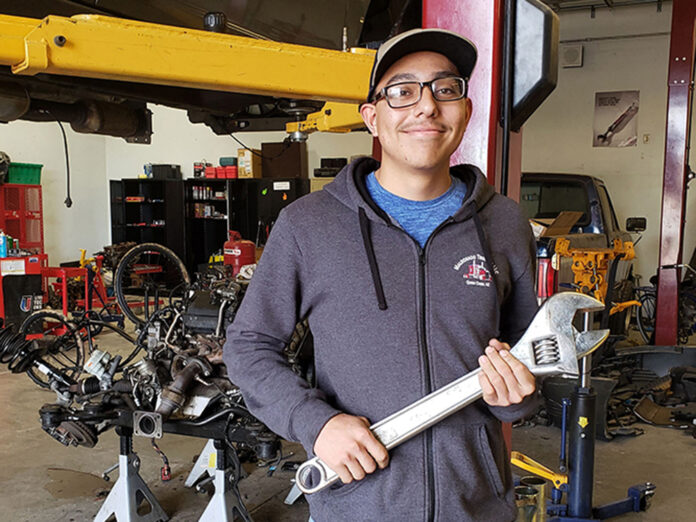
With Maricopa High seniors receiving diplomas this week, an interesting statistic came to light at a recent Maricopa Unified School District Governing Board meeting regarding graduation rates.
In Arizona, students in traditional track programs graduate at an average rate of 81%. At Maricopa High School, the graduation rate is 71.9%, with 445 of 619 students graduating, according to the Arizona Education Data Standards (AzEDS).
But students at MHS and statewide with a concentration in Career and Technical Education (CTE) courses graduate at an astronomical rate of 97%.
According to Dr. Emily Maxwell, assistant principal and CTE director at Maricopa High School, there is a tangible reason for that success.
“I believe these students have a higher rate of graduation because they feel connected to the program,” Maxwell said. “They also have a plan for after graduation because they are in a class that is connected to their future goals. Those who have a plan after high school are more likely to graduate.”
The CTE track is gaining popularity statewide. There are 349,231 students in Arizona’s 410 high schools. Just over 16%, or 56,037, of those students are CTE concentrators. More than one-third, or 125,857, are enrolled in at least one CTE course.
At MHS, about 45% of students are enrolled in at least one CTE course.
The successes continue after graduation. CTE concentrators go on to post-secondary education at a rate of 81% and 49% earn a post-secondary certificate, credential or diploma, while 41% are placed in employment, military service or an apprenticeship within six months.
That success is leading to more interest in the program, according to Maxwell.
“We are growing by leaps and bounds,” she said. “CTE includes rigorous programs of study that provide students with academic and technical skills. Students participate in relevant curriculum through hands on experience. CTE prepares learners for real world experiences by introducing them to workplace competencies, they gain the knowledge and training to succeed in their career.”
‘Multiple paths’
Dr. Tracey Lopeman, MUSD superintendent, said the district’s objective is to offer students a variety of ways to prepare themselves for their post-secondary education lives.
“MUSD is proud to offer multiple paths to graduation,” she said. “CTE students are challenged with rigorous and relevant coursework that prepares them to enter the workforce immediately upon graduation. When students earn certifications in CTE, they secure high-paying positions in their chosen field. The staff at Maricopa High School are not only amazing teachers, but they are industry experts that lead from real-world experience. Our skilled graduates are extremely sought after in a growing economy.”
Marlene Armstrong, principal at the new Desert Sunrise High School, said her school’s academy-based model will feature even greater exposure to CTE courses for the broader student body.
“The academy-based model is a small learning community where students work in cohorts (small groups),” Armstrong said. “Through this learning model, students participate in cross-curricular activities based on their elective choices.
“Because our academy electives are all CTE-based, all students at Desert Sunrise will participate in at least one CTE program.”
Armstrong also shared her views on why CTE students graduate at a higher rate.
“I believe the reason students who are CTE completers have a higher graduation rate is due to the active engagement and real-world application of academic content embedded within the CTE programs,” she said. “Students are exploring a high-interest area and are active participants in their future career goals (and are) applying what they have learned in their core classes to an area of interest.”
Desert Sunrise will offer a full array of CTE programs in three academies when it opens to freshmen and sophomores in July.
The STEM (Science, Technology, Engineering, Math) Academy will offer courses in air transportation, agri-science, engineering, software and app design, and sports medicine. The Leadership Academy will offer business management, digital communication, educational professions and sports broadcasting.
MHS currently offers CTE programs in the following areas: Air Force Junior ROTC, automotive technologies, computer animation, culinary arts, digital communications, digital photography, educational professions, engineering, graphic design, marketing, network security, software and app design, sports medicine and rehabilitation, stagecraft and technology device maintenance.





![Elena Trails releases home renderings An image of one of 56 elevation renderings submitted to Maricopa's planning department for the Elena Trails subdivison. The developer plans to construct 14 different floor plans, with four elevation styles per plan. [City of Maricopa]](https://www.inmaricopa.com/wp-content/uploads/2024/04/city-041724-elena-trails-rendering-218x150.jpg)

![Affordable apartments planned near ‘Restaurant Row’ A blue square highlights the area of the proposed affordable housing development and "Restaurant Row" sitting south of city hall and the Maricopa Police Department. Preliminary architectural drawings were not yet available. [City of Maricopa]](https://www.inmaricopa.com/wp-content/uploads/2024/04/041724-affordable-housing-project-restaurant-row-218x150.jpg)









